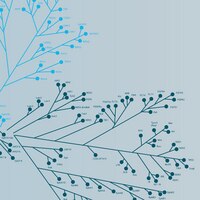Supervision of multiple signaling protein kinases by the CK2-Cdc37 couple, a possible novel cancer therapeutic target.
Miyata, Yoshihiko and Nishida, Eisuke
Ann. N. Y. Acad. Sci., 1030: 150-7 (2004)
2004
Mostrar resumen
Overexpression of a pleiotropic Ser/Thr kinase CK2 (casein kinase II), or of a kinase-targeting molecular chaperone Cdc37, induces neoplastic cell growth in animals. Recent genetic and biochemical evidence from several laboratories has revealed an unexpected direct link between CK2 and Cdc37. In this short review, we describe the basic characteristics of CK2 and Cdc37 and introduce recent findings on the interaction between CK2 and Cdc37. Cdc37 was identified as a multicopy suppressor of a temperature-sensitive allele of CK2 in Saccharomyces cerevisiae. CK2 phosphorylates a conserved serine residue in the N-terminal extremity of Cdc37 in vitro and in yeast as well as mammalian cells, and this is the unique phosphorylation site of Cdc37 under normal conditions. Mutations in the CK2-mediated phosphorylation site abolish the association of Cdc37 with various protein kinases. The same mutations in yeast cause severe growth and morphological defects. Specific inhibition of CK2 activity decreases intracellular levels of Cdc37-dependent protein kinases. Altogether, this evidence clearly indicates that the CK2-dependent phosphorylation is essential for the proper function of Cdc37 to bind and stabilize signaling protein kinases. In contrast, CK2 activity is enhanced by Cdc37 both in vitro and in vivo; thus, the CK2-Cdc37 couple seems to constitute a positive feedback control mechanism that may govern the activity of multiple protein kinases. Cdc37-dependent protein kinases include important signaling molecules whose disregulations are intimately related to neoplastic cell growth; hence, inhibition of the CK2-Cdc37 system may simultaneously suppress various cancer-promoting signal cascades. We propose that the CK2-Cdc37 couple can be a novel and efficient pharmacological target for cancer chemotherapy. | 15659792
 |
Order or chaos? An evaluation of the regulation of protein kinase CK2.
Olsten, Mary Ellen K and Litchfield, David W
Biochem. Cell Biol., 82: 681-93 (2004)
2004
Mostrar resumen
CK2 is a highly conserved, ubiquitously expressed protein serine/threonine kinase present in all eukaryotes. Circumscribed as having a vast array of substrates located in a number of cellular compartments, CK2 has been implicated in critical cellular processes such as proliferation, apoptosis, differentiation, and transformation. Despite advances in elucidating its substrates and involvement in cellular regulation, its precise mode of regulation remains poorly defined. In this respect, there are currently conflicting views as to whether CK2 is constitutively active or modulated in response to specific stimuli. Perhaps an important consideration in resolving these apparent discrepancies is recognition of the existence of many discrete CK2 subpopulations that are distinguished from one another by localization or association with distinct cellular components. The existence of these subpopulations brings to light the possibility of each population being regulated independently rather than the entire cellular CK2 content being regulated globally. Logically, each local population may then be regulated in a distinct manner to carry out its precise function(s). This review will examine those mechanisms including regulated expression and assembly of CK2 subunits, phosphorylation of CK2, and interactions with small molecules or cellular proteins that could contribute to the local regulation of distinct CK2 populations. | 15674436
 |
Protein kinase CK2 as regulator of cell survival: implications for cancer therapy.
Unger, G M, et al.
Curr Cancer Drug Targets, 4: 77-84 (2004)
2004
Mostrar resumen
Recent studies have generated sufficient information to warrant a consideration of protein kinase CK2 as a potential target for cancer therapy. CK2 is a ubiquitous and highly conserved protein serine/threonine kinase that has long been considered to play a role in cell growth and proliferation. It is essential for cell survival, and considerable evidence suggests that it can also exert potent suppression of apoptosis in cells. This is important since the cancer phenotype is characterized by deregulation of not only proliferation but also of apoptosis. In normal cells, the level of CK2 appears to be tightly regulated, and cells resist a change in their intrinsic level of CK2. However, in all the cancers that have been examined an elevation of CK2 has been observed. Further, it appears that modest deregulation in the CK2 expression imparts a potent oncogenic potential to the cells. Disruption of CK2 by treatment of cells with antisense CK2 results in induction of apoptosis in a time and dose-dependent manner. Thus, we propose that down-regulation of CK2 by employing specific strategies to deliver antisense CK2 in vivo could have a potential role in cancer therapy. | 14965269
 |












